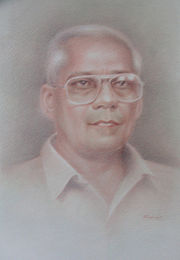Rouf's Contribution
The writer and philosopher Abdur Rouf Choudhury depicted a transparent portrait of modern Bengali life in home and abroad. He had a remarkable openness to modern Western culture and knowledge as well as Eastern. Choudhury made a lasting contribution to Bengali literature with his novels, short stories, travelogue, essays and his introspective autobiographical and epistolary works.
It is essential to analyses Choudhury’s writings in the light of the social scenario from 60s-90s, when deprivation and degradation were taken for granted in Bangladesh, London and India-Pakistan which were known by some and unknown by others. These realities some times were dedicated and made indelible in the name of religious sermons and social sanctions. Thus his main task was to focus readers' attention, by giving a frame-by-frame picture of the helplessness and inhuman predicament of the victims of injustice.
In Porodeshe Porobashi (Life on Distant Shores) Abdur Rouf Chowdhury has not only discovered London, where he stayed with fellow Sylhetis, but also discovered his own homeland. When you are for away, when you are detached from your object of love, your inner eye gets working and you discovery the truth. This discovery is ugly from a close look but is beautiful and lovable when seen from a distance. Most of us who stay in our homeland fail to take a close look at it. But the novelist succeeds in discovering his own land while staying overseas and thinking of it and loving it. Reality and nostalgia get mixed with each other to form a perfect image of the writer's homeland in his mind. Porodeshe Porobashi is a quality work of art by any standard. The writer is a powerful narrator and uses wit and humour quite deftly. He is a skilful user of words. The writer depends on autobiographical elements and has a philosophical outlook. He clearly understood the psyche of Bangladeshis staying abroad. He dips deep into the human mind, as he has written elsewhere about the book, the writer mixes reality with the light and shade of truth. Thus it is a true picture of common life. It is lively and hat at all dull, neither a travelogue nor a memoir, it is a novel with lively characters, a touching story of human suffering and a story of the eternal lonely man.
The wide canvas of words and tales of this artist brought out the plight of women in the male-dominated set-up of society. Over and above the Islamic-based code of beliefs of the society; male-domination society pushed woman into complete subjugation, making them property for the use of men, because of such a 'life-style's set-up, economical and social oppression was principally faced by women. This drove women to utter frustration and desperation. Choudhury portrayed women, their plight, and their helplessness in the face of this male-dominated society. On the other hand, he wrote about their sense of humanitarian values, their love, sorrows, their deep longing for a life as normal and beautiful as free women.
In the wake of the 1971 Bangladesh Liberation War, which surged up all over Bangladesh , was recounted in his writing Ekti Jatike Hotay (Legacy of a Nation). Abdur Rouf Choudhury believed that in today’s world men no longer wanted to keep themselves constricted within the sphere of a specified duty.
In Choudhury’s time, in a modern society with priest as its advocate and protector, religion lost all its progressivism. It went so far that religion became bogged down in rituals, superstitions and bigotry, while its proponents stank of greed, corruption, even debauchery: even the so-called mullahs could not keep themselves free from this downfall. Almost half the characters in his novels Sampan Crass (St. Pancras) and Aniketon represented the mainstay of the decadent society, while the other half, were absorbed with the emerging thoughts, ideals and values of the new society - humanist and secular in content.
Choudhury’s most vividly depicted the unity of Bengal and the articulation of Bengali nationalism in his novel Natun Diganta (New Horizon) vol. 1, 2, 3. Reason and humanity - these are its two eternal pillars. The essence of Choudhury’s thought is a complete faith in the efficiency of these two immeasurable forces. Its most striking characteristic is its insistent association of work, precept and practice. It appeals not to controversial tests, not to any appearance of sweet reasonableness but to trials in the rough and tumble of life, and it will accept no other judgment. Natun Diganta gives warning against: 1) dogma, mysticism, ceremonial, hypnotism, the binding of the mind and will by oaths, and other inventions of external authority in religion and politics, 2) participation in violence, individual or social, and organisation’s dependence on violence, 3) exploitation, luxury and material property, 4) self-degradation and 5) devotion to self-sacrifice.
In Choudhury’s short-stories the write portrays the changes of village life brought by the time. He is very much in love with his motherland, the rivers and paddy fields. He portrays the London life of people from Sylhet quite faithfully and in great detail. Researchers will find his works useful in the future. Abdur Rouf Choudhury handles a lot of characters and a wide range of time. Most of the writings are perfect picture of our society, and it has a lovely appearance also. In some of his short stories the writer gives a lot of importance to the physical state of human existence, society should get rid of its negative forces, and build strength on human body and its soul, both of which are deeply linked, and hence both are very important for human beings.

